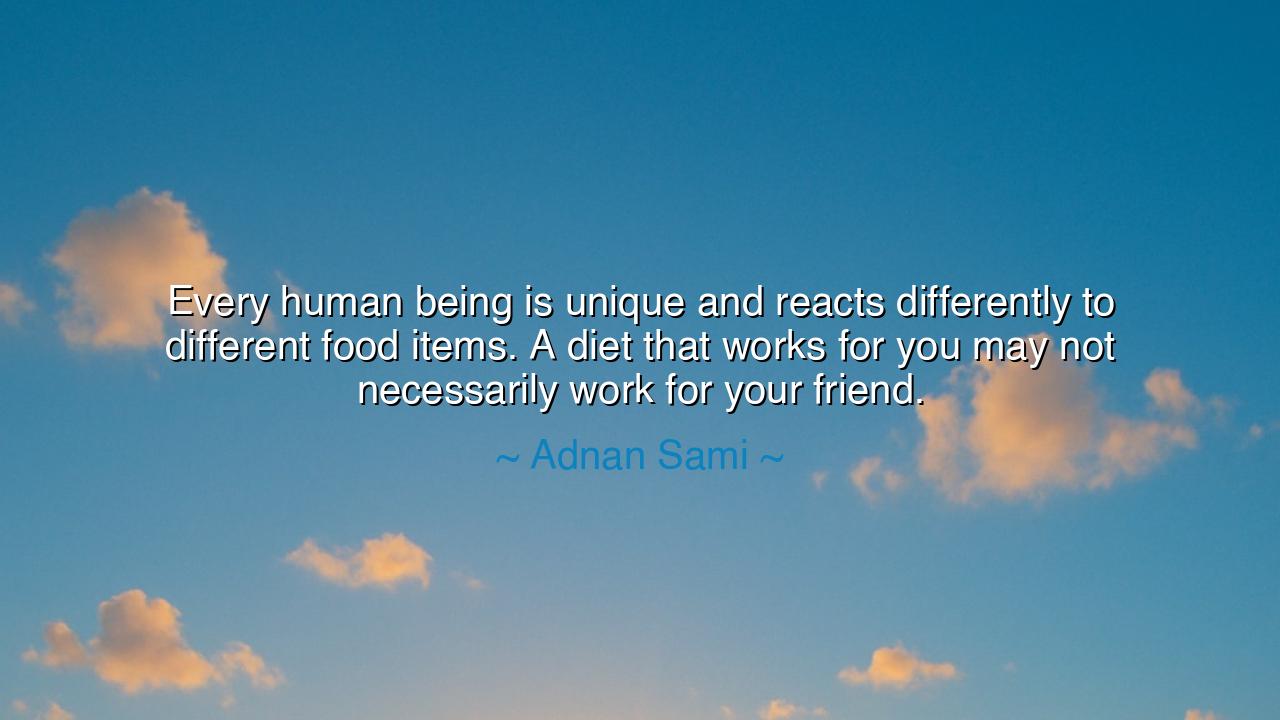
Every human being is unique and reacts differently to different
Every human being is unique and reacts differently to different food items. A diet that works for you may not necessarily work for your friend.






"Every human being is unique and reacts differently to different food items. A diet that works for you may not necessarily work for your friend." These words, spoken by Adnan Sami, encapsulate a profound truth that has been understood by the great philosophers, healers, and spiritual leaders of the past: that the path to health and well-being is not a one-size-fits-all journey, but one that requires careful attention to the individual and their unique needs. Just as each soul is unique, so too is the body, and the food we consume must align with our specific constitution, environment, and life goals. This timeless wisdom reflects the ancient understanding that balance, self-awareness, and personalized care are at the heart of true health.
In the time of the Greeks, Hippocrates—the father of modern medicine—taught that the body and mind are inextricably linked, and that a diet that works for one person may not be appropriate for another. He understood that the body’s needs are shaped not only by the physical condition but also by the temperament, environment, and lifestyle of the individual. For Hippocrates, there was no universal cure—no one-size-fits-all solution to health. Each person must find their own balance, choosing foods that align with their own unique nature. Sami’s words echo this ancient understanding: the diet that nourishes one individual may not be the solution for another. The key to health lies in personalization and awareness of one’s body.
The Romans too, recognized the profound connection between an individual’s constitution and their dietary needs. The great Cicero, while extolling the virtues of moderation, also understood that the human body is not a machine that operates identically for all people. He believed that the health of the body and mind came from careful observation and understanding of what nourished the individual. For Cicero, the most virtuous life was one in which people acted according to their own nature, understanding what foods worked best for them. Sami’s perspective on personalized diets mirrors this Roman philosophy, where the knowledge of one’s body and its needs is the key to lasting vitality and well-being.
Consider the example of Pythagoras, the Greek philosopher and mathematician, who believed in the deep connection between diet and spiritual growth. Pythagoras followed a strict vegetarian diet, but he did not impose this upon others. He understood that the choice of diet is deeply personal and tied to one’s own physical and spiritual condition. Just as Sami emphasizes the need for an individualized approach to food, Pythagoras recognized that while a plant-based diet nourished him, it may not have been the right choice for everyone. This ancient wisdom invites us to reflect on our own unique needs and understand that personalized nutrition is the key to achieving both health and inner peace.
In Ayurvedic tradition, the ancient Indian system of medicine, there is an understanding that each person’s body is a combination of elements—earth, water, fire, air, and ether. These elements influence not only a person’s physical appearance but also their temperament and dietary needs. The ancient Ayurvedic texts advise that food should be chosen according to one’s dosha—the specific combination of elements that govern their body. Just as Sami suggests, this ancient wisdom recognizes that what may work for one person might disrupt another’s balance. A diet that nourishes one dosha may not support another, as each individual’s needs are unique. The lesson here is one of self-awareness, of listening to the body’s whispers and learning which foods contribute to vitality and which lead to imbalance.
The lesson in Sami’s words is clear: health is not found in rigid, one-size-fits-all approaches, but in the personal exploration of what nourishes our own bodies. Each person is an intricate combination of genetics, environment, lifestyle, and personal preferences, and as such, the foods that serve us best will vary. It is in the journey of self-discovery—of paying attention to how we feel after eating different foods, of testing what works and what doesn’t—that we unlock the key to our long-term well-being. This approach to health mirrors the timeless teachings of the ancients: we are not machines, but complex, dynamic beings who require individualized care.
In practical terms, Sami’s advice calls for a deeper understanding of our own bodies. It challenges us to step away from fad diets and extreme measures and to focus on self-awareness. By paying attention to how we feel after different meals, noticing how our energy levels fluctuate, and being open to experimenting with what works best for us, we move toward a more personalized and sustainable approach to health. Balance, not restriction, is the key to a diet that nourishes us in both body and spirit.
Thus, let us take Adnan Sami’s words to heart and embrace the ancient wisdom of personalized nutrition. Just as the great philosophers and healers of the past encouraged us to honor the uniqueness of each individual, we must also understand that our bodies are unique and require individualized care. Let us listen to the whispers of our bodies, honor what makes us different, and choose foods that align with our personal needs. In doing so, we will create lives of balance, vitality, and long-term health, just as the wise ones of the past taught us.






AAdministratorAdministrator
Welcome, honored guests. Please leave a comment, we will respond soon